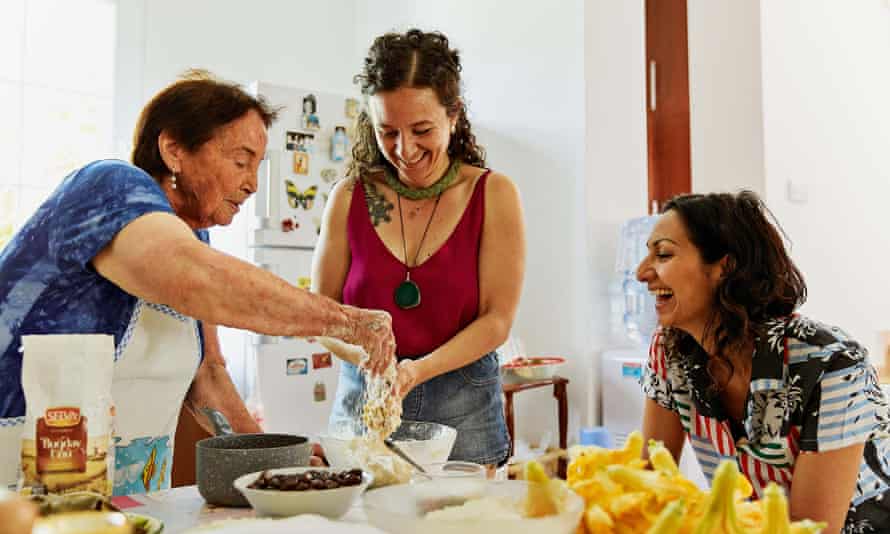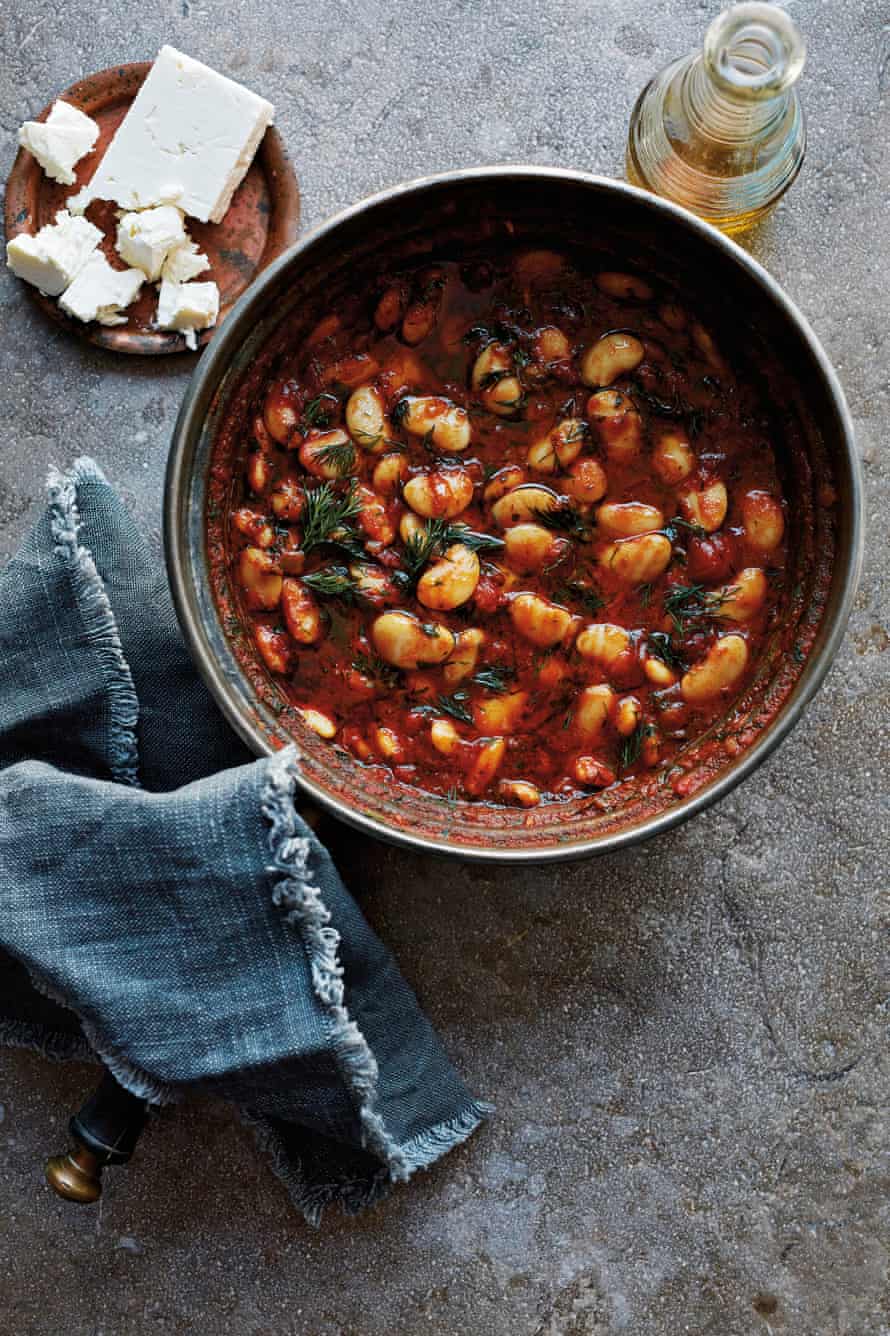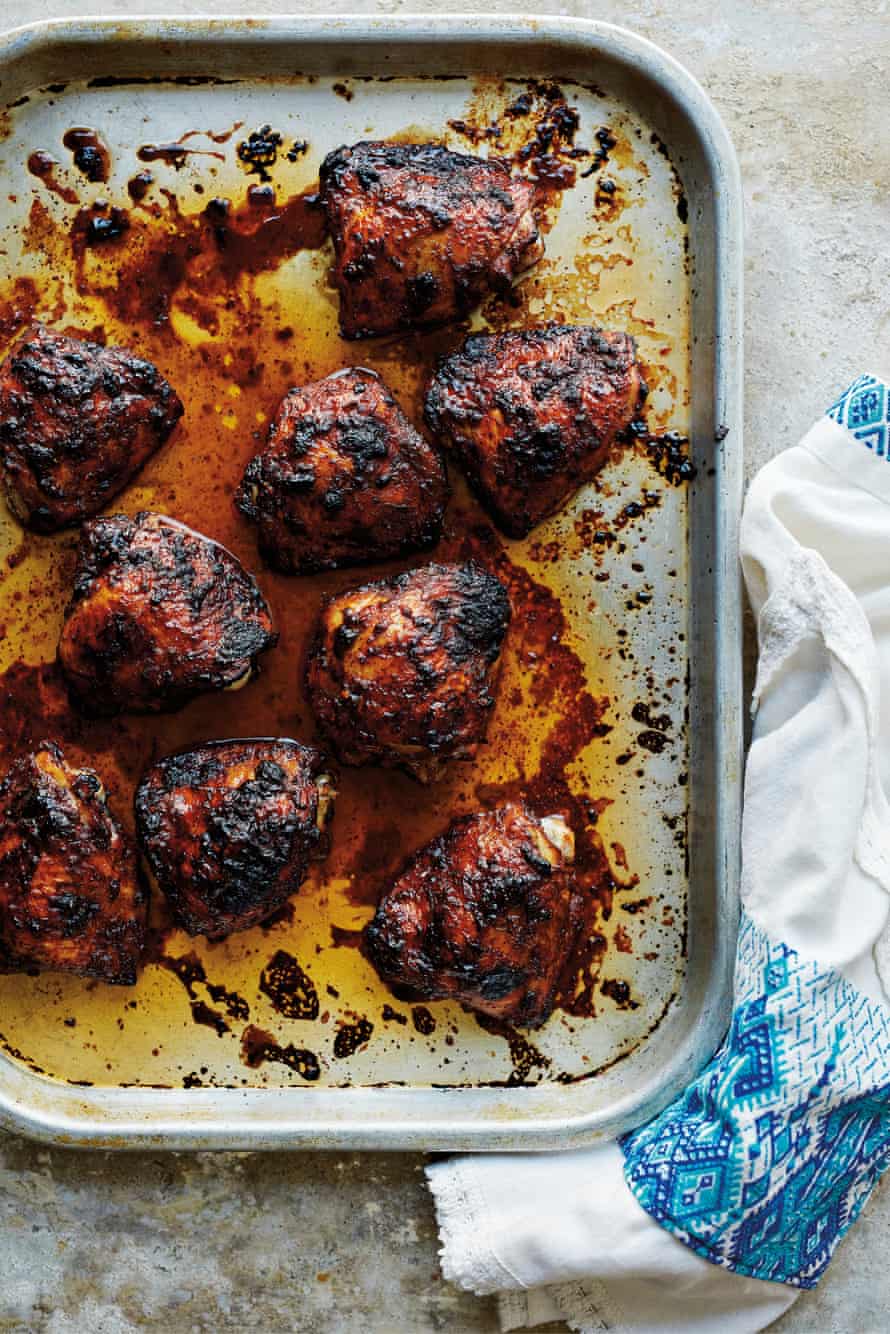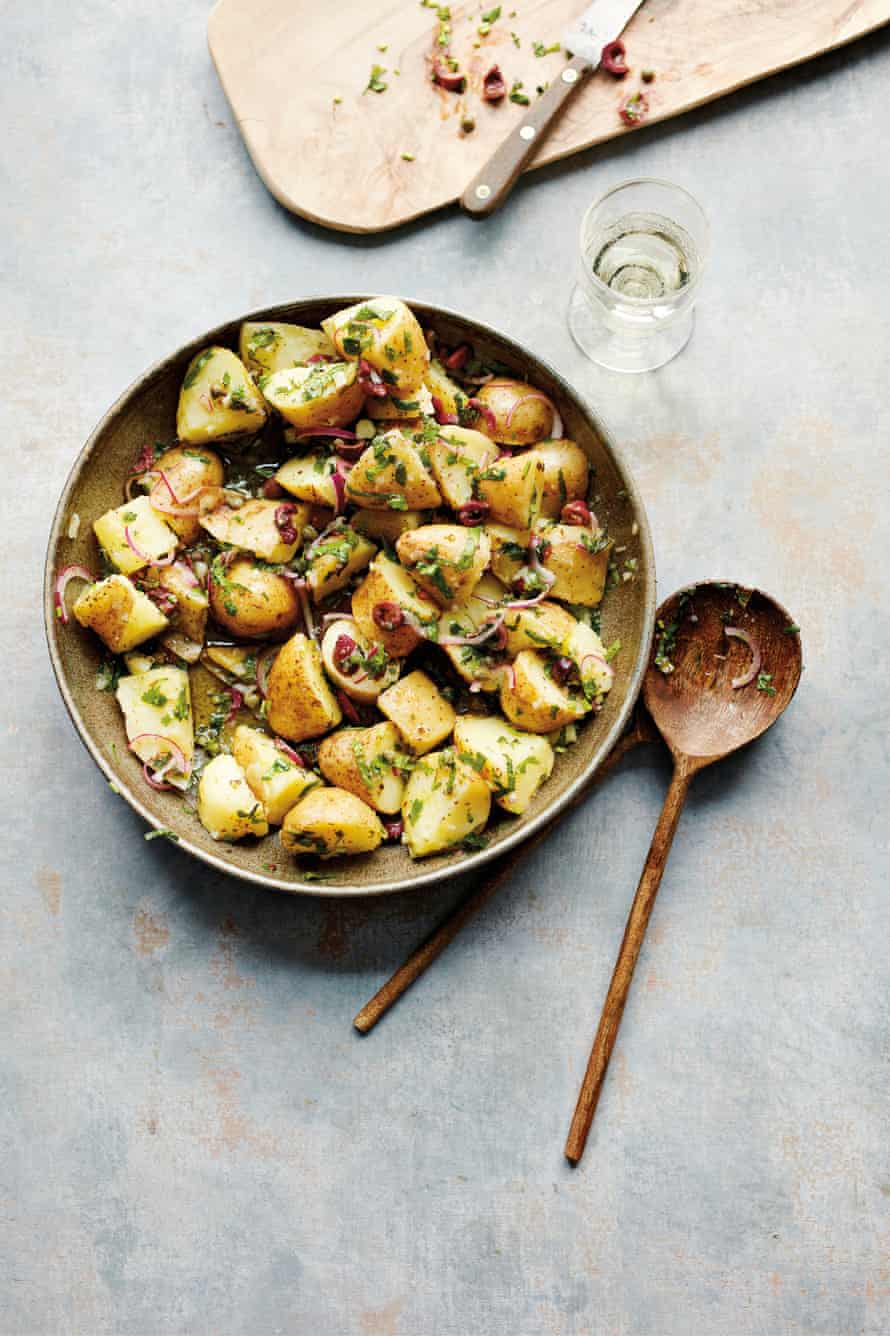Two stories in Yasmin Khan’s cookbook Ripe Figs tell of the power of food.
In the first, Khan recounts how Greek volunteers started bringing containers of food for migrants who were sleeping in a park – but insisted on the food being homemade. “We wanted to convey the message that somebody cares about you. Cares enough to spend their afternoon baking a cake that smells or feels like home,” said Nadina Christopoulou, one of the founders of the initiative.
Second is the story of Home for All, a restaurant on the banks of a fishing port on the edge of the Gulf of Yera in Lesbos, where, every day, 40 immigrants are brought from some of the most violent refugee camps to eat at a restaurant that is bright, communal, and full of life. “Being able to eat in this comfort, at a table, with proper cutlery … it restores people’s dignity, it reminds them who they are. It makes them feel like home,” said Katerina Katsouris, who co-owns Home for All with her husband.
Those acts of care are what inspired Khan, the chef and author of Zaitoon, to take a trip to Greece, Turkey and Cyprus to cook in refugee camps. She saw how one’s humanity can be restored over a plate of food, a glass of wine, a conversation at a shared table. The cookbook focuses on the similarities between the foods from each place. That way, writes Khan, “you can begin to see similarities where political borders insist upon division and difference”.

You say you want this book to open people’s eyes to the migrant crisis. Why did you think a cookbook would be a good place to bring this topic alive?
Food is an incredibly powerful vehicle for helping us understand ourselves, and the world around us. When you learn about food, you don’t just learn about a set of ingredients. You learn about history, geography, migration. For many years I was a human rights campaigner, working on issues ranging from police shootings to the blockade of Gaza. What I learned was when you’re trying to raise awareness of quite heavy political issues, the most important thing to do is to try and build a connection. Food is such a wonderful way of connecting people, because it’s so visceral, something we can all relate to.
In the US and the UK, there’s often an attitude around migration that ‘We don’t have enough’. You find people who really don’t have much opening their arms – and not just saying, ‘We’re going to give you a sandwich’, but ‘We’re going to make sure every single thing we give you is homemade’. Talk to me about that difference.
Turkey is the biggest recipient of refugees in the world: there are 3.6 million refugees in Turkey. In 2020, the US, settled just under 12,000. The way refugees and migrants have been used as scapegoats by political leaders on both sides of the Atlantic doesn’t really reflect the numbers of people moving to these countries, nor the fact that migration is just an essential part of what it means to be human. Throughout our history, we’ve always moved for our survival.
You mention in the book that you chose recipes from Greek, Cyprus and Turkey to focus on similarities between places where governments insist on seeing difference.
Absolutely. Borders are completely a man-made construct. The very notion of nation states is a very recent one in human history – we’re looking at a few hundred years, mostly. I just wanted to pull right back and look at the region, where we don’t see artificial lines and try to, yes, celebrate the commonalities.
You believe in open borders.
We do have open borders for a section of society. The rich can move very easily. Cyprus is a classic example: on the one hand, you’ve got refugees making perilous journeys on choppy waters and small boats, trying to get to the island and then potentially being put in a camp. And then, for others, there are [investor citizenship schemes] where, if you invest €2m into Cyprus, you can buy a European passport.
In a lot of western democracies, especially in the US and the UK, there’s often a presumption that good food is a luxurious or a middle-class preoccupation – a rich people thing. What do you think of that mindset?
I’m of mixed heritage: my mom’s from Iran, my dad’s from Pakistan. My family are small-scale farmers in the north of Iran. Food is such a huge occasion for celebration in my family. Every meal – whether breakfast, lunch or dinner – is one of the highlights of the day.
Sometimes people ask me, wasn’t it difficult talking to people about food in this really challenging circumstance? No, o
f course it wasn’t, it was really fun! In [some places], people live to eat and the concept of food is about a broader concept of community. That’s wonderful. Food is like a universal language that enables you to communicate feelings of empathy, of connection, of hope, of love.
What do you hope this book will open people’s eyes to?
That there isn’t some kind of migration crisis – this is just what happens when you put up fences and walls. It is the wrong response. As long as humans have existed, we have travelled, and migration has been an intrinsic part of survival. I just hope the book fosters greater understanding and empathy for refugees and migrants so that we can start co-existing in a shared planet, in the way we deserve to.
Smoky lima beans – gigantes plaki

This is one of those punchy pantry recipes that is easy to whip up as a midweek meal and takes its inspiration from a traditional Greek dish of beans baked in a tomato sauce. What gives this dish its unique flavor is the paprika (I add both the smoked and sweet versions, not the hot and spicy type), which adds a richness and earthiness that I find irresistible. I alternate between sprinkling crumbled feta on top of this dish and having it plain, as it’s just as delicious without. Serve warm or at room temperature.
Prep 10 min
Cook 65 min
Serves 4 as part of a mezze or 2-3 as a main course
3 tbsp vegetable oil
1 small onion, finely chopped
2 garlic cloves, crushed
1 x 400g tin of diced plum tomatoes
1 tsp granulated sugar
1½ tsp dried oregano
1½ tsp sweet paprika
½ tsp smoked paprika
¼ tsp ground cinnamon
2 x 425g tins of lima beans, drained and rinsed
200ml just-boiled water
3 tbsp extra-virgin olive oil
1 tbsp finely chopped dill, plus more to serve
1 tbsp finely chopped parsley leaves, plus more to serve
100g feta cheese, crumbled (optional)
Salt
Black pepper
Heat the vegetable oil in a large saucepan. Add the onion and gently fry over medium heat for 12 to 15 minutes until soft. Add the garlic and cook for another few minutes, then add the tomatoes, sugar, oregano, both types of paprika, cinnamon, 1 teaspoon salt, and a generous grind of black pepper. Cover and simmer for 15 minutes.
Add the beans to the tomato sauce with the hot water and another ½ teaspoon salt. Cover and cook over low heat for 30 minutes.
Stir in the extra-virgin olive oil and herbs and cook for a final five minutes. Taste, adjust the seasoning, and sprinkle with more herbs, and crumbled feta if you fancy it, just before serving.
Pomegranate and sumac chicken

This is an easy chicken sheet pan recipe inspired by a Syrian meal I ate at Reem, a restaurant on the Greek island of Lesvos run by Mahmud Talli. A Syrian doctor who managed to escape the war, Mahmud found himself trapped on the island after seeking refuge there, and soon put all his efforts into helping to provide services for new arrivals to Lesvos volunteering at a local community kitchen and establishing his restaurant. This sticky roasted leg of chicken can be marinated ahead of time and just popped into the oven shortly before eating. If you don’t want to use chicken thighs, this also w
orks with a whole chicken, jointed into eight pieces.
Prep and marinate 3 hr 30 min
Cook 35 min
Serves 4
8 large chicken thighs, skin-on, bone-in
3 tbsp olive oil
3 tbsp pomegranate molasses
1 tbsp tomato paste
½ tsp ground allspice
2 tsp pul biber (Aleppo pepper)
1 tsp sumac
¼ tsp ground cumin
2 big garlic cloves, crushed
Salt
Black pepper
Place the chicken in a large bowl and pour all the ingredients (except the olive oil) over it with 1½ teaspoons salt and ½ teaspoon black pepper. Using your hands, massage this into the chicken until it is evenly coated, then cover and place in the refrigerator to marinate for at least 3 hours.
When you are ready to eat, take the chicken out of the refrigerator and let it come to room temperature (this will take about 20 minutes).
Preheat the oven to 200C/390F/gas 6.
Place the chicken on a rimmed baking sheet and drizzle with the olive oil. Transfer the sheet to the oven and roast for about 35 minutes, or until the juices from the chicken run clear when it is pierced at the thickest part.
Cypriot potato salad

A zesty, herb-packed potato salad, perfect for serving alongside grilled meats or fish. Try to use kalamata olives here, but, if you can’t find those, just aim for the olives to be oily rather than briny in these dishes. Be sure to toss the dressing in while the potatoes are still warm, as they absorb the flavors better.
Prep 10 min
Cook 12 min
Serves 4
1kg Cyprus or new potatoes
1 medium unwaxed lemon, finely zested
¼ red onion, finely sliced
60g black olives, pitted and roughly chopped
2 tbsp capers, drained and rinsed
1 tsp dried oregano
3 tbsp extra-virgin olive oil
2 tbsp lemon juice
handful of mint leaves, finely chopped
handful of cilantro, finely chopped
Salt
Black pepper
Cut the potatoes into large (5cm) chunks. I like to leave the skins on, but remove them if you prefer.
Bring a large saucepan of water to a boil. Add 1 teaspoon salt and the potatoes to the pot and boil for about 12 minutes until they are soft. Drain and place in a serving bowl.
Add all the remaining ingredients along with ¼ teaspoon salt and a generous grind of black pepper.
Recipes reprinted from Ripe Figs: Recipes and Stories from Turkey, Greece, and Cyprus, published by W W Norton & Company